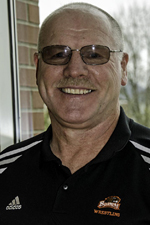Abstract

“Memories of a Champion Heavyweight”
March 21, 2016
Location: Valley Library, Oregon State University. Watch Video | Download Transcript (PDF)
In the interview, Bielenberg provides a detailed overview of his family background and upbringing, emphasizing the heavy importance that his family placed on hard work and discussing the particulars of life that arose as a result of being one of ten children. He then reflects on his first acquaintance with sports, which came about during his years as a student at Silverton High School, and traces his evolution as a wrestler from a novice to a state champion. He concludes his memories of his upbringing by reflecting on the Kennedy assassination and commenting on the important role that hunting and fishing played in his family's subsistence.
From there, Bielenberg recalls the process by which he was recruited to attend Oregon State University, noting his initial impressions of OSU wrestling coach Dale Thomas as well as many of his freshman year teammates. He then shares his memories of campus life in the early 1970s, responding to questions about the counter-culture, living in a housing cooperative, his academic progression, and attending OSU basketball games.
The next section of the interview focuses on Bielenberg's advancement as a wrestler at OSU, concentrating in particular on the development of his style, memorable matches, training methods of the era, and the difficulty of attaining All American status. Specific attention is paid to Bielenberg's sophomore season, which ended with his winning the NCAA national championship in the heavyweight division.
A major topic of the interview is former OSU wrestling coach Dale Thomas. In reflecting on his former coach, Bielenberg speaks fondly on Thomas's hard-nosed coaching style, his penny-pinching program administration, and his straight-forward approach to conditioning and skill development. He likewise shares multiple humorous stories of life on the road, travelling from meet to meet in a van and often staying in dorm rooms or people's homes. Bielenberg concludes with an appreciation of Thomas's achievements as a coach and a meditation on the important role that Thomas played in the personal development of generations of Oregon State wrestlers.
Bielenberg next recalls his career as a wrestler competing in international competitions. In this, he details his experiences as an alternate on the 1976 Olympic team as well as his participation in the 1978 World Championships and his travels all around the world for a wide range of international tournaments. Of particular interest are Bielenberg's memories of competing in the Soviet Union, near the Iranian border, during the period of the American hostage crisis in Iran. Bielenberg likewise speaks eloquently of his encounters with apartheid during a 1972 wrestling exchange to South Africa.
The final phase of the interview concentrates on Bielenberg's career in the pharmaceuticals industry, his being named to the Pac-12 All Century Wrestling Team, his induction into the OSU Athletics Hall of Fame, and the paths through life taken by his wife and children. The session concludes with Bielenberg's words of advice to students today.

